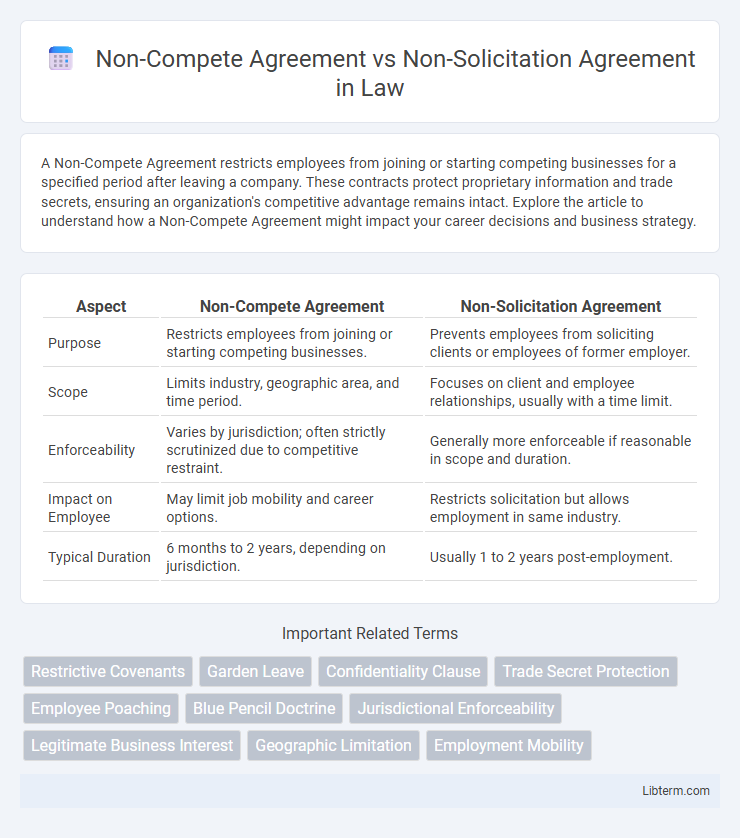A Non-Compete Agreement restricts employees from joining or starting competing businesses for a specified period after leaving a company. These contracts protect proprietary information and trade secrets, ensuring an organization's competitive advantage remains intact. Explore the article to understand how a Non-Compete Agreement might impact your career decisions and business strategy.
Table of Comparison
| Aspect | Non-Compete Agreement | Non-Solicitation Agreement |
|---|---|---|
| Purpose | Restricts employees from joining or starting competing businesses. | Prevents employees from soliciting clients or employees of former employer. |
| Scope | Limits industry, geographic area, and time period. | Focuses on client and employee relationships, usually with a time limit. |
| Enforceability | Varies by jurisdiction; often strictly scrutinized due to competitive restraint. | Generally more enforceable if reasonable in scope and duration. |
| Impact on Employee | May limit job mobility and career options. | Restricts solicitation but allows employment in same industry. |
| Typical Duration | 6 months to 2 years, depending on jurisdiction. | Usually 1 to 2 years post-employment. |
Introduction to Non-Compete and Non-Solicitation Agreements
Non-Compete Agreements restrict employees from joining or starting competing businesses within a certain geographic area and time frame after leaving an employer, protecting trade secrets and business interests. Non-Solicitation Agreements prevent former employees from poaching clients, customers, or employees, preserving company relationships and workforce stability. Both agreements serve crucial roles in safeguarding a company's competitive advantage and confidential information post-employment.
Defining Non-Compete Agreements
Non-Compete Agreements are legal contracts that restrict employees or parties from entering into competing businesses within a specific geographic area and time frame after leaving an employer. These agreements aim to protect trade secrets, proprietary information, and business interests by limiting competitive activity that could harm the employer. Understanding the scope and enforceability of Non-Compete Agreements is crucial for assessing their impact on employee mobility and business competition.
Understanding Non-Solicitation Agreements
Non-Solicitation Agreements restrict former employees or business partners from directly contacting or enticing clients, customers, or employees away from a company, ensuring protection of business relationships and workforce stability. These agreements typically specify a duration and geographic scope, tailored to prevent unfair competition without broadly limiting an individual's employment opportunities. Understanding the legal enforceability and specific terms of Non-Solicitation Agreements is crucial for both employers and employees to safeguard interests while complying with state laws.
Key Differences Between Non-Compete and Non-Solicitation Agreements
Non-Compete Agreements restrict an employee or party from engaging in similar business activities that compete directly with the employer for a specified duration and geographic area, aiming to protect trade secrets and business interests. Non-Solicitation Agreements specifically prevent former employees or contractors from soliciting the employer's clients or employees, focusing on maintaining existing relationships. The key difference lies in scope: Non-Compete Agreements broadly limit competitive behavior, while Non-Solicitation Agreements narrowly target solicitation efforts without prohibiting work in the same industry.
Common Clauses in Non-Compete Contracts
Non-compete agreements typically include clauses defining the restricted activities, duration, geographic scope, and consequences of breach, which serve to prevent employees from joining or starting competing businesses. Key clauses often specify the exact industry or competitive roles prohibited, a reasonable time frame for the restriction--commonly six months to two years--and the geographic area affected, which must be narrowly tailored to be enforceable. Non-solicitation agreements, while related, focus on prohibiting the solicitation of clients or employees rather than broader competitive restrictions, with clauses detailing the protected parties and the length of the non-solicitation period.
Essential Elements of Non-Solicitation Clauses
Non-solicitation clauses primarily restrict employees or former business partners from soliciting clients, customers, or employees of the company for a specified period. Essential elements include a clear definition of the prohibited solicitation activities, a reasonable time frame often ranging from six months to two years, and geographical scope limitations to ensure enforceability. The clause must be narrowly tailored to protect legitimate business interests without unduly restricting the individual's ability to work.
Enforceability and Legal Considerations
Non-Compete Agreements often face stricter scrutiny and limited enforceability due to their broad restriction on an individual's ability to work within a geographic area and timeframe, which varies by state law. Non-Solicitation Agreements generally enjoy greater enforceability as they narrowly restrict solicitation of clients or employees without overly restricting employment opportunities. Legal considerations include state-specific statutes, reasonableness of scope and duration, and the necessity to protect legitimate business interests while avoiding undue hardship on the employee.
Pros and Cons for Employers and Employees
Non-Compete Agreements restrict employees from working with competitors after leaving, protecting employer trade secrets but potentially limiting employee job mobility and earning potential. Non-Solicitation Agreements prevent former employees from contacting clients or recruiting coworkers, safeguarding client relations while imposing fewer career restrictions. Employers benefit from Non-Compete Agreements through stronger market protection, though they risk legal challenges and reduced talent attraction; Non-Solicitation Agreements offer balanced protection with higher enforceability and less employee backlash.
Industry Practices and Typical Use Cases
Non-Compete Agreements commonly protect businesses in technology and manufacturing industries by restricting employees from joining direct competitors within a specified geographic area and time frame. Non-Solicitation Agreements are prevalent in service sectors such as consulting and sales, preventing former employees from poaching clients or recruiting current staff without limiting their employment opportunities. Industry practices favor Non-Compete Agreements for safeguarding proprietary innovations, while Non-Solicitation Agreements effectively maintain client relationships and workforce stability without hampering career mobility.
Best Practices for Drafting and Negotiating Restrictive Covenants
Best practices for drafting non-compete and non-solicitation agreements include clearly defining the scope, duration, and geographic limitations to ensure enforceability under relevant state laws. Tailoring restrictive covenants to protect legitimate business interests, such as trade secrets and client relationships, while avoiding overly broad or indefinite restrictions helps balance employer protection with employee mobility. Negotiation should involve open communication, consideration of employee roles, and potential compensation or consideration to enhance agreement validity and prevent future disputes.
Non-Compete Agreement Infographic

 libterm.com
libterm.com